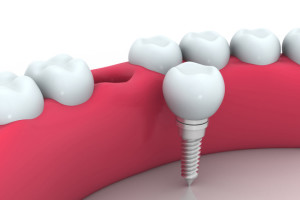 Dental implants are often chosen by patients who need to replace a tooth that was lost due to tooth decay or gum disease. They offer a structurally complete tooth replacement and have a number of advantages over alternatives like dentures and dental bridges. Understandably, these patients want reassurance that those conditions will not compromise the replacement tooth as well.
Dental implants are often chosen by patients who need to replace a tooth that was lost due to tooth decay or gum disease. They offer a structurally complete tooth replacement and have a number of advantages over alternatives like dentures and dental bridges. Understandably, these patients want reassurance that those conditions will not compromise the replacement tooth as well.
The implant itself, which is a small cylinder made of titanium, is not made of biological material so it is not directly susceptible to the effects of the oral bacteria that cause cavities and periodontal disease.
However, the answer to this question is not quite that simple. Gum disease can affect the stability of a dental implant by degrading the quality of the underlying bone that supports it. Osseointegration, which is the process of bone bonding with the implant after the oral surgeon places it, is the keystone of the durability and stability of the dental implant.
If that bone is destroyed by the inflammation associated with gum disease, then the bond between bone and implant will be weakened and the implant may fail.
Furthermore, when surrounding teeth are affected by cavities and gum disease, it can also increase the risk of bone loss in the area adjacent to the implant and threaten the stability of the smile.
Therefore, a robust oral hygiene routine takes on even greater importance after you have received a dental implant. Your oral surgeon will give you instructions on how to take care of your smile after dental implant placement.
Dental implants can last for decades with proper maintenance, but the patient must do a good job of brushing, flossing, eating a nutritious diet and following up with routine dental care in order to reduce the impact of oral diseases and maximize the lifespan of a dental implant. Please ask one of our knowledgeable team members any questions you may have about this aspect of your treatment.






